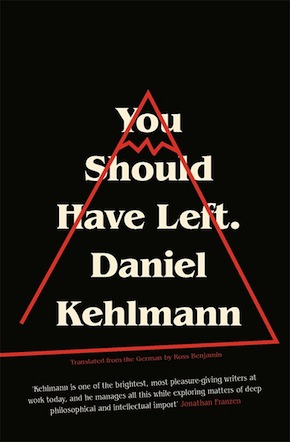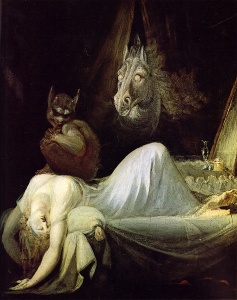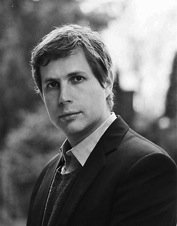Alpine dreams
by Mika Provata-Carlone
“Guaranteed to unsettle.” Irish Times
The German language is a wondrous thing. Among its many mischiefs and perplexities, the word for ‘nightmare’ must be a recurring source of dismayed jollity: an Alptraum is not a dream on an idyllic Alpine peak, tarn or flowery green meadow gone awry, but a night-time experience never to be forgotten – if survived. It is a visit, no less, by the redoubtable Alp, the elf-goblin incubus that bends every dimension of reality down to its most horrific warp and twist, quashing both man and reason under its insufferable weight.
Daniel Kehlmann’s You Should Have Left plays tacitly on this double entendre, this juncture and disjuncture between states of consciousness, whether in sleep or under particular circumstances of the state of wakefulness. An aspiring writer, with one doubtful success story under his belt, takes his wife and young daughter to a picturesque cabin in the Swiss mountains. It will be a writer’s retreat, a family cocoon, a return to the elementals of a relationship on the verge of a precipice, a flight from a civilisation that looms too vast and complex, subhuman and beyond the human scale at the same time. This “architect-designed”, highly romanticised Airbnb haven will provide Kehlmann with the backdrop for textured psychological drama, bracketed irony and flamboyant gothic acrobatics.
His narrator possesses highly veneered intelligence and an awful lot of shoulder chips: his self-contentment at his own brilliance, evinced by means of a narcissistic game of admiring mock-self-criticism and voyeuristic interiority, is in constant tension with Susanna, his superiorly educated wife. She “has a degree in comp lit and classical studies” whereas he is self-taught; she is precise, rational, executive, where he is intuitive, hypersensitive, a créateur. After a lengthy, atmospherically sharp description to be included in his long-awaited script for the sequel to Besties, a commercial film he did not actually author exclusively, he notes laboriously and sincerely in his notebook: “Or is that too many metaphors? The sun doesn’t push its way anywhere, the wind pushes the cloud away, and of course the sky by no means melts. But in painful, blazing magnificent brilliance, not bad.”
Fiction and reality interchange as he seems to straddle the world of script and life simultaneously, indistinguishably.”
This artist constantly paring his nails and looking at himself has an acute awareness of the layer upon layer of sublimation and ratiocination that he is piling on existence and on writing. Fiction and reality interchange as he seems to straddle the world of script and life simultaneously, indistinguishably, each feeding the other with indiscriminate interpretative lenses but also with a perspicacity that amplifies every twitch and the slightest intake of breath: “Someday I’ll write a movie about all this. Long dialogues, lots of flashbacks, no music. It will be called Marriage. The title hasn’t been used yet; astonishingly, it’s available.”

Nachtmahr by Johann Heinrich Füssli, 1802, depicting an Alp sitting on the sleeper’s chest. Frankfurter Goethe-Haus/Wikimedia Commons
When one ‘designs’ people’s past, present and future, character, behaviour, predicament and corporeality, their virtual celebrity and success, how easy is it to belong and relate to real events and human life? Almost impossible, Kehlmann seems to say, with a not so imperceptible nod to his own role as a writer. Add to the already complex mathematics of virtual understanding the factor of a generation saturated with planes of surrogating, and of phenomenological simulation, and the commentary of the text or on it becomes rather formidably forbidding: real lives under the weight of the Alp of “painful, blazing, magnificent brilliance” are crushed to a flat perspective of character, development of plot, climax and an ingenuous resolution. No ancestral pain, past, history, attachment or deeper emotion can penetrate the density of the metaphors, the glass wall of metanarrative potential.
The sleek, unopposed sliding of untouching planes of existence suddenly comes to a halt as mundane details of betrayal accelerate a dissolution that has already happened. Friction replaces emotional responsiveness, absurdity exposes disconnectedness. Parallel lives, however postmodern, are no longer possible; they become instead mutually hostile, binary life choices, narrative threads that are unilaterally and exclusively true or false. The setting creates an aura of clinical alienation and stilling proximity. Stock characters from early twentieth-century thrillers inject a serum of gothic suspense and darkness to the idealised Swiss countryside, exposing all that is festering in real human lives. The end seems inevitable and also intolerable – and Kehlmann plays on our manipulated expectations to pull off a rather spectacular hat trick.
One is tempted to remind the characters that an Alp will go away if only one points one’s shoes towards one’s bed and hides a few rusty bolts and nails in the mattress.”
Written in a self-conscious (the inevitable term is “architect-designed”), stream-of-consciousness style, this trim novella would like to claim for itself the distinction of a spectacular coup de théâtre, and Kehlmann’s novels have been hailed in the past as “postmodern comedies”, dark and glittering German masterpieces. You Should Have Left is a story full of craft and scintillating devices, yet the almost post-Romantic persona of the artist (a recurring theme in Kehlmann’s work) is too smugly self-applauding, even in what should be perceived as the novel’s moments of highest angst and tragedy. As the manipulating perception behind a perpetually written script, and now manipulated in turn by the supernatural echoes in a house that seems to exist in its own quantum universe of self-absorbed and absorbing actuality, Kehlmann’s narrator either lacks the room for convincing expansion or development, or possesses, sadly, little substance to sustain the linguistic and narratological construct he inhabits. One is tempted to remind the characters that an Alp will go away if only one points one’s shoes towards one’s bed, rather than the other way around, and hides a few rusty bolts and nails in the mattress. Too much Kantian aestheticism, perhaps, too much meta-modern formalism, and not much art or form? You Should Have Left is a chilling, curious little book, finely translated, and a promise of innovative maturity for its author, but not altogether convincing in and of itself.
 Daniel Kehlmann was born in Munich in 1975 and lives in Vienna, Berlin and New York. His previous novels include Measuring the World, Me & Kaminski, Fame and F, and he has won numerous prizes, including the Candide Prize, the WELT Literature Prize, and the Thomas Mann Prize. You Should Have Left, translated by Ross Benjamin, is published by Riverrun in hardback, eBook and audio download. Read more.
Daniel Kehlmann was born in Munich in 1975 and lives in Vienna, Berlin and New York. His previous novels include Measuring the World, Me & Kaminski, Fame and F, and he has won numerous prizes, including the Candide Prize, the WELT Literature Prize, and the Thomas Mann Prize. You Should Have Left, translated by Ross Benjamin, is published by Riverrun in hardback, eBook and audio download. Read more.
kehlmann.com
Author portrait © Heji Shin
Ross Benjamin is a translator and writer based in Nyack, New York. His previous translations include Joseph Roth’s Job (Archipelago, 2010), and Clemens J. Setz’s Indigo (Liveright/Norton, 2014). He is currently working on a translation of Franz Kafka’s complete Diaries, to be published by Liveright/Norton.
rossmbenjamin.com
Mika Provata-Carlone is an independent scholar, translator, editor and illustrator, and a contributing editor to Bookanista. She has a doctorate from Princeton University and lives and works in London.

